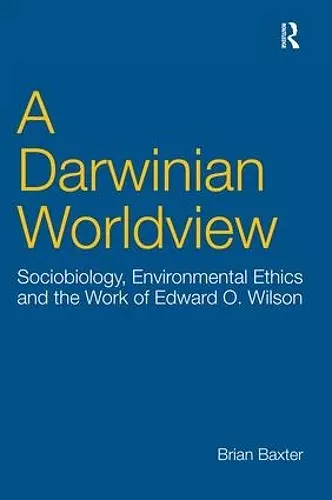A Darwinian Worldview
Sociobiology, Environmental Ethics and the Work of Edward O. Wilson
Format:Hardback
Publisher:Taylor & Francis Ltd
Published:28th Jul '07
Currently unavailable, and unfortunately no date known when it will be back
This hardback is available in another edition too:
- Paperback£52.99(9781138259461)

Darwin's theory of evolution by natural selection is considered in its application to human beings in this book. Brian Baxter examines the various sociobiological approaches to the explanation of human behaviour which view the human brain, and so the human mind, as the product of evolution, and considers the main arguments for and against this claim. In so doing he defends the approaches against some common criticisms, such as the charge that they are reductionist and dehumanising. The implications of these arguments for the social sciences and humanities are assessed, as is the naturalistic view of ethics to which they lead. A key issue examined in the book is the connection between this Darwinist perspective on human beings and modern environmental ethics, which also often assume that human beings are part of an evolved living world. The implications of these positions for the meaningfulness of human life are also examined. Throughout the discussion the positions in sociobiology and environmental ethics developed by Edward O. Wilson are taken as an exemplar of the characteristic features of a Darwinian worldview, and the arguments of Wilson and his chief critics are thoroughly examined.
'Brian Baxter's A Darwinian Worldview is a major scholarly achievement, which breaks new ground in environmental theory by taking seriously the normative implications of humans not just being like other animals, but being a species of animal. In it he brings the evolutionary insights of Darwin, and later writers in what we can call the 'naturalistic tradition', such as E.O. Wilson, together with major concerns of environmental ethics and human responsibilities towards the non-human world. His synthesis is at once provocative and original; provocative in reminding us that human instincts do matter, (but avoiding the pitfalls of a simplistic socio-biological perspective) and original in providing a naturalistic and evolutionary foundation for human care for the non-human world. Baxter has produced a significant and genuinely interdisciplinary work bridging natural science, social science and ethical investigation, and points the way towards a new research horizon, which others will follow. It is rare to find a work which so patiently and clearly highlights the evolutionarily-grounded ethical nuances of the human condition both as a part of, as well as apart from, the nonhuman world and that convincingly demonstrates why, and how, what unites us with the non-human world is prior to and significant for what differentiates us, but cannot be used to support the long-standing position of some ontological gulf and separation between humanity and the non-human world. Baxter is to be roundly congratulated on producing such a path-breaking piece of scholarship.' John Barry, Queen’s University Belfast, Northern Ireland ’The author examines the concept that the human brain and behavior are products of Darwin’s theory of evolution by natural selection...a rigorous work”directed toward biologists and social scientists”dealing with complex, controversial issues...Recommended.’ Choice
ISBN: 9780754656784
Dimensions: unknown
Weight: 453g
208 pages